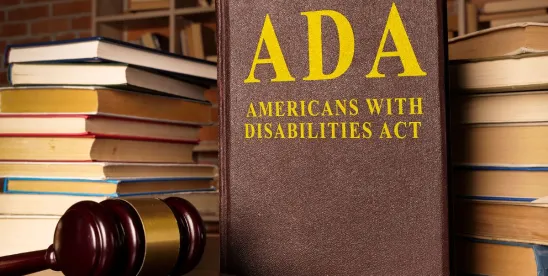How far does an employer’s judgment about essential functions take you? In Larry Tate v. Thomas Dart, the Seventh Circuit examined an employee’s claim that his employer’s refusal to promote him because it could not accommodate his medical restrictions violated the Americans with Disabilities Act (ADA). Spoiler alert, the Seventh Circuit found in the employer’s favor.
Facts and the Lawsuit
Larry Tate had worked for the sheriff in the Department of Corrections since 2007. Although he suffered a back injury early in his career, he returned to work under medical restrictions that included avoiding “situations in which there is a significant chance of violence or conflict.” The sheriff later promoted Tate to sergeant. So far, so good.
Tate took and passed the promotional exam for lieutenant, was certified as eligible for promotion, and was provisionally promoted to lieutenant. Human Resources told Tate that his promotion to lieutenant was contingent on receiving medical clearance from his doctor because lieutenants were required to regularly manage and defuse violent inmate situations. According to the Department of Corrections, being able to manage disruptive inmate behavior and respond to emergency situations was an “essential function” of the lieutenant position. Given that Tate was medically restricted from performing that function, the sheriff returned him to the rank of sergeant.
Tate filed a lawsuit alleging failure to accommodate his disability in violation of the ADA. The district court granted the sheriff’s motion for summary judgment, finding that all lieutenants in the Department of Corrections must be able to physically respond to emergency situations involving inmate violence. Tate appealed this decision.
What Happened on Appeal
Although the Seventh Circuit found the district court to be “too deferential” to the employer’s view about essential job functions, it ultimately affirmed the district court’s opinion.
Under the ADA, an employer must make reasonable accommodations that would allow a qualified individual (someone who, with or without reasonable accommodations, can perform the essential functions of the position) to perform the essential functions of the job. To determine the essential functions of a job, a court should consider a number of factors, including:
-
The employer’s judgment about what functions are essential;
-
Written job descriptions of the position;
-
Amount of time spent on the function;
-
Impact of not requiring the employee to perform the function;
-
Terms of any collective bargaining agreement; and
-
Work experience of past incumbents to the position or current work experience of incumbents in similar positions.
The Seventh Circuit noted that although the employer’s judgment is an important factor, it is not necessarily a decisive factor.
According to the Seventh Circuit, although the district court overly deferred to the sheriff’s judgment of essential job functions, a review of the other factors in conjunction with the sheriff’s judgment resulted in a determination that the ability to physically respond to inmate violence was in fact an essential function of the lieutenant job. Since Tate could not perform this essential function (because of his back injury), he was not a qualified individual for this job.
Takeaways
First, don’t expect a court to rely on your judgment alone about essential job functions. Even if you feel pretty sure that the employee can’t perform the job, make sure you have good documentation that you considered all of the relevant factors.
Second, make sure you look to any written job descriptions (even really old ones that you have been meaning to update). You would rather think about those job descriptions before you don’t hire or promote someone who has a disability (rather than trying to avoid those documents in litigation).
Finally, take a hard look at the incumbents in the job. How often do they perform the essential function (i.e., is it essential)? The fact that incumbents don’t perform the function often does not preclude it from being essential — but be sure you can defend its essential nature.




 />i
/>i

